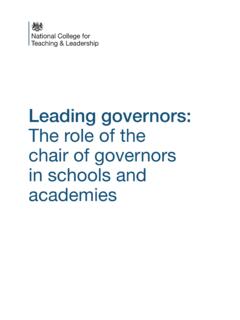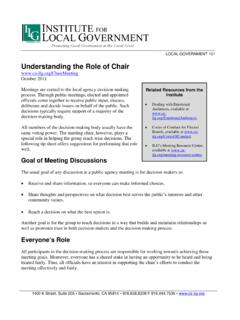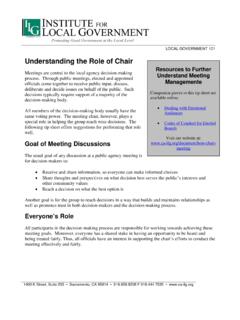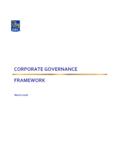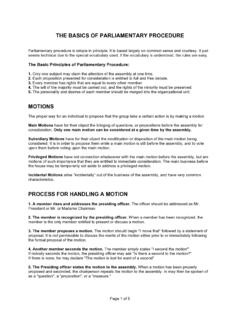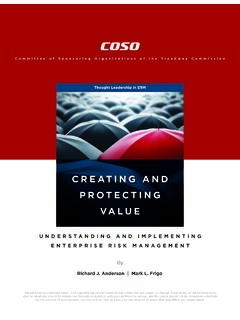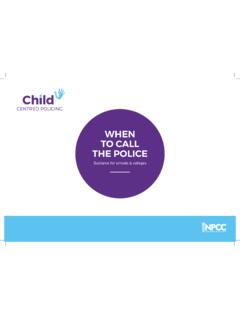Transcription of A competency framework for governance
1 A competency framework for governance The knowledge, skills and behaviours needed for effective governance in maintained schools, academies and multi-academy trusts January 2017 1 Contents Foreword 3 Introduction 4 About this framework 4 Structure 4 Terminology 4 Who is this publication for? 5 Review date 5 A competency framework for governance 6 Principles and personal attributes 7 Knowledge and skills 8 1. Strategic leadership 8 1a. Setting direction 8 1b. Culture, values and ethos 9 1c. Decision-making 10 1d. Collaborative working with stakeholders and partners 11 1e. Risk management 12 2. Accountability for educational standards and financial performance 14 2a. Educational improvement 14 2b. Rigorous analysis of data 15 2c. Financial frameworks and accountability 16 2d. Financial management and monitoring 17 2e. Staffing and performance management 18 2f. External accountability 19 3.
2 People 20 3a. Building an effective team 20 4. Structures 22 4a. roles and responsibilities 22 5. Compliance 23 5a. Statutory and contractual requirements 23 6. Evaluation 25 6a. Managing self-review and development 25 6b. Managing and developing the board s effectiveness 25 2 Foreword The importance and significance of outstanding governance and leadership across our education system, in every school in England, has never been greater. the role of governing boards in defining and implementing strategy whilst holding the leaders of schools and trusts to account has to be the foundation upon which a world class education system is built. Governors or trustees who work as a team, who are able to bring their skills and experience to the role and who blend challenge and support to hold their workforce to account, will improve standards. Our shared ambition is to ensure that there are enough good school places for every child in England.
3 What we have attempted to do in this competency framework for governance is to define more clearly the knowledge, skills and behaviours needed for governance to play its full part in this vision. The development of this framework was informed by great practice, evidence of what governance at its best can deliver and a deep understanding of the role that clarity of vision, purpose and action contributes to school improvement. Sir David Carter National Schools Commissioner for England 3 Introduction Effective governance provides strategic direction and control to schools, academies and Multi-Academy Trusts (MATs). It creates robust accountability, oversight and assurance for their educational and financial performance and is ambitious for all children and young people to achieve the very best outcomes. About this framework The framework sets out the competencies needed for effective governance .
4 It is non-statutory guidance and should be read alongside the governance Handbook, particularly the section explaining the key features of effective governance . Academy trusts should also refer to the Academies Financial Handbook. The framework is applicable to all boards in proportion to the scale and complexity of the organisation they are governing. Boards will need to consider which knowledge and skill areas outlined in the framework are most important for their context. They will also need to determine the extent to which it applies to any committees they have appointed, including within multi-academy trusts to any local governing bodies, depending on the range of functions delegated to them. The framework does not aim to apply specifically to the Members of academy trusts. Members are not directly involved in governance , which is the responsibility of the board of trustees. However, as they appoint trustees and oversee the success of the board of trustees they have appointed, members will want to understand the skills, behaviours and knowledge trustees need to be effective.
5 The framework does not apply directly to pupil referral units, sixth-form colleges and general further education (FE) colleges though they may find its general principles helpful. Structure The framework begins with the principles and personal attributes which, alongside the commitment of time and energy to the role , underpin effective governance . Following on from this, the knowledge and skills required for effective governance are organised into those which are essential for everyone on the board; those which are required of the chair and those which at least someone on the board should have. In this way, the knowledge and skills required for chairs build on and complement the skills for everyone. Terminology Throughout the document references to: the board should be taken to mean the accountable body for the school or group of schools. In local authority maintained schools, this will be the governing body; and in a single academy trust (SAT) or MAT, it will be the board of trustees 4 organisation should be taken to mean the school; federation; SAT or MAT being governed as appropriate executive leaders should be taken to mean those held to account by the board for the performance of the organisation.
6 This may be the CEO, executive headteacher, headteacher or principal, as well as other senior employees/staff, depending on the structure of the organisation trustees means those that sit on the board of an academy trust (who in some trusts are known as directors) and Local governing body (LGB) means a committee of a multi-academy trust board that is established as such under the trust s articles of association. Who is this publication for? This competency framework is for: the boards of local authority (LA) maintained schools and academy trusts in England training providers designing and delivering governance training and development others with an interest in the governance of schools1. Some of the ways in which boards2 may want to use the framework include: informing how they carry out a skills audit in individual performance review discussions, identifying training needs and/or developing a training and development programme putting together a role specification and determining interview questions for recruiting to the board and/or in selecting or recruiting a chair planning induction for people new to the board supporting a review of the board s effectiveness and identifying strengths and areas for development demonstrating the key characteristics and expectations of their role to others ensuring the expected behaviours are included in the board s code of conduct.
7 Review date The competency framework will be kept under regular review and updated as necessary, including to reflect changes to policy. 1 For example: the LA of a maintained school; parents of registered pupils; and the appropriate diocesan authority or appropriate religious body if the school is designated as having a religious character under (3) of the Schools Standard and framework Act 1998 2 Boards of maintained schools may liaise, where appropriate, with the relevant LA since it must secure, free of charge, certain information and training for governors under of the Education Act 5 A competency framework for governance The framework is made up of 16 competencies underpinned by a foundation of important principles and personal attributes. The competencies are grouped under the headings of the six features of effective governance , which are set out in the governance Handbook: strategic leadership; accountability; people; structures; compliance and evaluation.
8 6 Principles and personal attributes The principles and personal attributes that individuals bring to the board are as important as their skills and knowledge. These qualities enable board members to use their skills and knowledge to function well as part of a team and make an active contribution to effective governance . All those elected or appointed to boards should fulfil their duties in line with the seven principles of public life (the Nolan principles). They should also be mindful of their responsibilities under equality legislation, recognising and encouraging diversity and inclusion. They should understand the impact of effective governance on the quality of education and on outcomes for all children and young people. In addition, all those involved in governance should be: Committed Devoting the required time and energy to the role and ambitious to achieve best possible outcomes for young people.
9 Prepared to give time, skills and knowledge to developing themselves and others in order to create highly effective governance . Confident Of an independent mind, able to lead and contribute to courageous conversations, to express their opinion and to play an active role on the board. Curious Possessing an enquiring mind and an analytical approach and understanding the value of meaningful questioning. Challenging Providing appropriate challenge to the status quo, not taking information or data at face value and always driving for improvement. Collaborative Prepared to listen to and work in partnership with others and understanding the importance of building strong working relationships within the board and with executive leaders, staff, parents and carers, pupils/students, the local community and employers. Critical understanding the value of critical friendship which enables both challenge and support, and self-reflective, pursing learning and development opportunities to improve their own and whole board effectiveness.
10 Creative Able to challenge conventional wisdom and be open-minded about new approaches to problem-solving; recognising the value of innovation and creative thinking to organisational development and success. 7 Knowledge and skills 1. Strategic leadership Why it s important: Effective boards provide confident, strategic leadership to their organisations; they lead by example and set the tone from the top . These competencies relate to the core function of boards to set vision, ethos and strategic direction. 1a. Setting direction The knowledge and skills required for effectiveness in setting the strategic direction of the organisation, planning and prioritising, monitoring progress and managing change. Everyone on the board Knowledge key themes of national education policy and the local education context key features of effective governance the strategic priorities (and where appropriate, charitable objects) for their organisation tools and techniques for strategic planning principles of effective change management the difference between strategic and operational decisions Skills and effective behaviours thinks strategically and contributes to the development of the organisation s strategy can articulate the organisation s strategic priorities (and where appropriate, charitable objects)










